Mobilizing Insights in Defence and Security (MINDS) – Annual report 2022-2023
Message From The Assistant Deputy Minister (Policy)
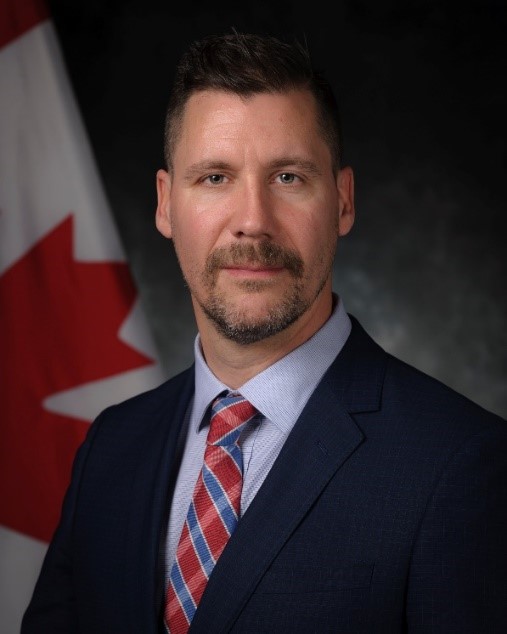
I am pleased to present the 2022-23 Mobilizing Insights in Defence and Security (MINDS) Annual Report. As the program completes its fourth year, it has reaffirmed its reputation as a valuable asset to the Defence Team through its consistent delivery of relevant and timely advice to policy and decision makers. This year has been marked by new and persisting challenges in the global security environment, and in response, MINDS facilitated numerous engagements, projects, scholarships, and collaborative partnerships to support and inform the Department's work on priority files.
In Budget 2022, the Government of Canada committed to updating its Defence Policy Strong, Secure, Engaged (SSE) to provide support for the continued commitments to building a modern military that helps protect our country from a range of new and emerging threats. In support of the Defence Policy Update, MINDS leveraged its network of external defence and security experts to participate in focused roundtable discussions and help inform the implementation of the policy update's objectives.
Also this year, the Government of Canada released its Indo-Pacific Strategy to deepen partnerships in the region. To help inform our implementation of this strategy, MINDS organized several expert panel briefings to explore foreign and domestic strategies in the region and their implications for defence.
MINDS also continued to inform the Defence Team's understanding and policy development on efforts on issues related to culture change, climate security, defence of the Arctic, procurement, and emerging technologies, among others. The program hosted twenty virtual webinars and roundtable discussions, which offered nuanced and complex insights on policy-relevant issues.
In the year ahead, I am confident that MINDS will continue to expand its delivery of policy-relevant expertise to meaningfully support the work of the Defence Team.
Peter Hammerschmidt
Assistant Deputy Minister (Policy)
Department of National Defence
Excutive Summary:
In its fourth year of operations, the MINDS program continued to build on its successes and further enhanced its capacity to deliver timely and impactful insights. The program facilitated numerous engagements to support the Defence Team's work on priority files, including the Defence Policy Update, continental defence and the Indo-Pacific Strategy, as well as hosted virtual webinars and roundtable discussions on a wide variety of policy-relevant issues. The program also demonstrated its commitment to knowledge exchange and collaboration by selecting three new Collaborative Networks and awarding funding grants and scholarships for new projects and research.
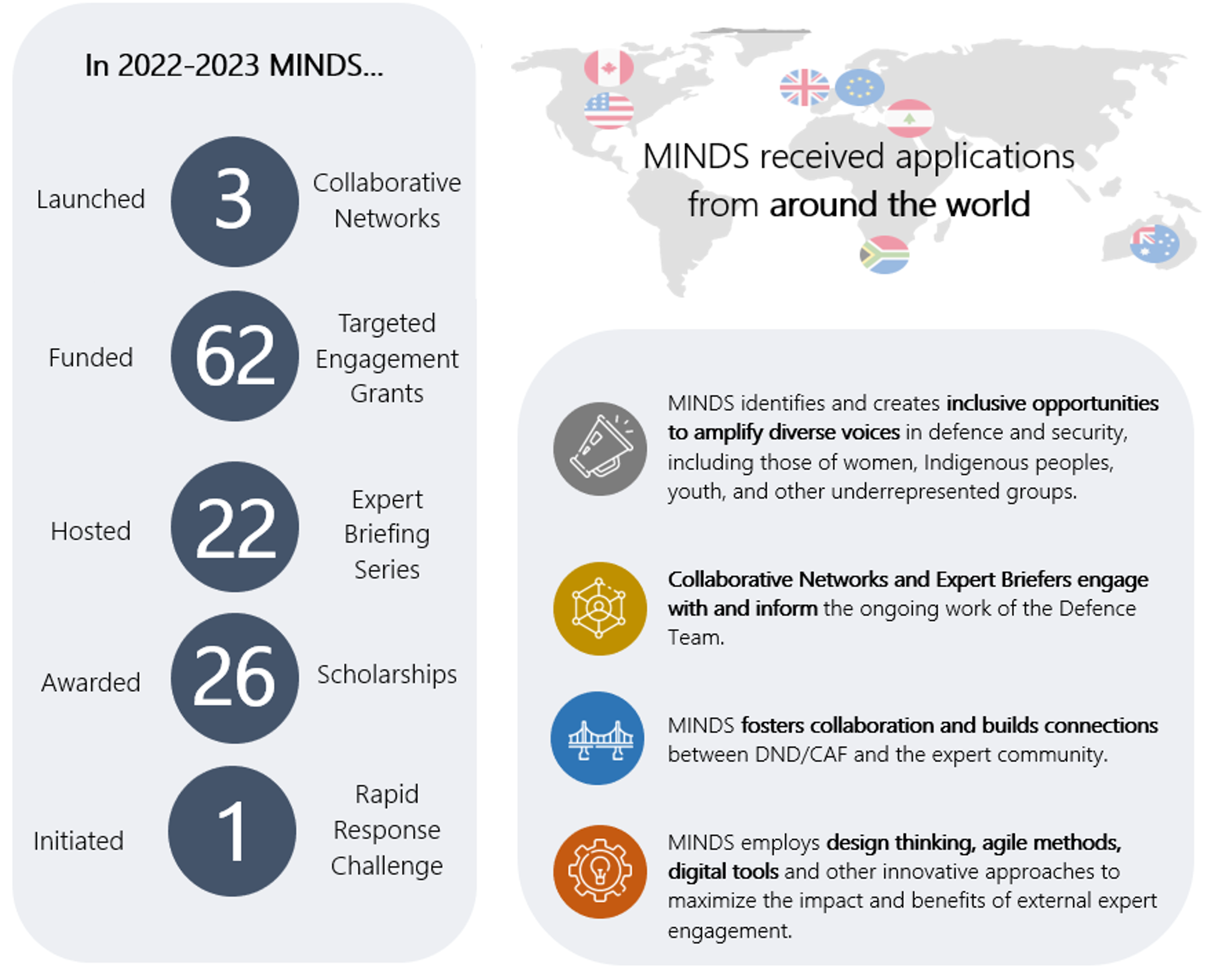
Caption
A graphic showing that in 2022-2023 MINDS:
- Launched 3 Collaborative Networks
- Funded 62 Targeted Engagement Grants
- Hosted 22 Expert Briefing Series
- Awarded 26 Scholarships
- Initiated 1 Rapid Response Challenge
A map of the world with text across stating “MINDS received applications from around the world”. The map shows seven flags: Canada, United States, United Kingdom, European Union, Lebanon, South Africa, and Australia.
Four icons with corresponding text:
- An icon depicting a megaphone with the following text to its right: “MINDS identifies and creates inclusive opportunities to amplify diverse voices in defence and security, including those of women, Indigenous peoples, youth, and other underrepresented groups.”
- An icon depicting a network with the following text to its right: “Collaborative Networks and Expert Briefers engage with and inform the ongoing work of the Defence Team.”
- An icon depicting a bridge with the following text to its right: “MINDS fosters collaboration and builds connections between DND/CAF and the expert community.”
- An icon depicting a lightbulb inside of a gear with the following text to its right: “MINDS employs design thinking, agile methods, digital tools and other innovative approaches to maximize the impact and benefits of external expert engagement.”
The MINDS Program
MINDS is founded on the idea that policy- and decision-making are strengthened when assumptions are challenged and diverse viewpoints are considered. MINDS provides opportunities for collaboration between the Defence Team and the defence and security expert community through a program that:
- responds to the needs for relevant and timely advice from defence and security experts;
- fosters the next generation of experts and scholars; and,
- contributes to Canadians' understanding of defence and security issues.
MINDS Pillars
MINDS offers a variety of unique tools, or pillars, by which the Defence Team can engage with external experts to access high calibre, relevant and timely research and expertise, which incorporates a diversity of viewpoints and provides well-rounded advice. Those tools include:
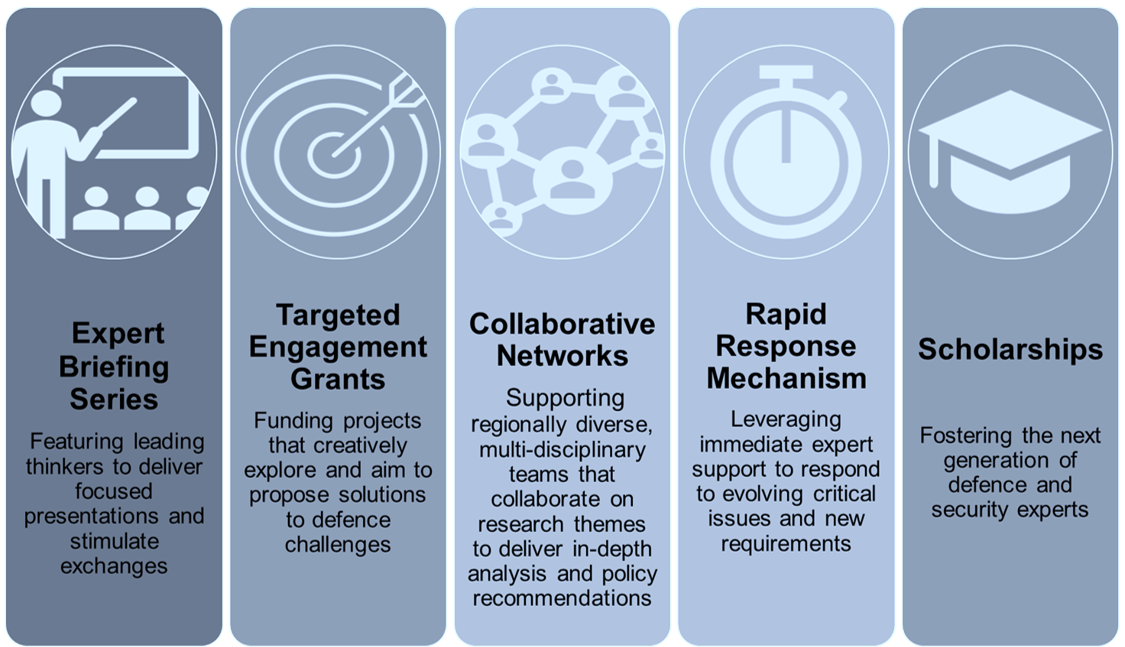
Caption
Five icons with corresponding text:
- An icon of a person delivering a presentation to an audience with the following text underneath: “Expert Briefing Series: Featuring leading thinkers to deliver focused presentations and stimulate exchanges”
- An icon of an arrow hitting a target with the following text underneath: “Targeted Engagement Grants: Funding projects that creatively explore and aim to propose solutions to defence challenges”
- An icon of a network with the following text underneath: “Collaborative Networks: Supporting regionally diverse, multi-disciplinary teams that collaborate on research themes to deliver in-depth analysis and policy recommendations”
- An icon of a stopwatch with the following text underneath: Rapid Response Mechanism: Leveraging immediate expert support to respond to evolving critical issues and new requirements”
- An icon of a graduate cap with the following text underneath: “Scholarships: Fostering the next generation of defence and security experts”
Year In Review
In 2022-23, the MINDS program remained dedicated to its mandate of fostering internal and external outreach and building the relationship between the Defence Team and the defence and security expert community.
Expert Advice in an evolving environment
While Canada's current Defence Policy, Strong, Secure, Engaged (SSE) remains the foundation for how the Canadian Armed Forces (CAF) are supported and equipped to protect Canadians and Canadian interests, the threat landscape has changed since this policy was developed. As a result, the Government of Canada announced a defence policy review in Budget 2022 in support of its broader international priorities and the changed global environment. To inform this policy review, the MINDS program built on the extensive consultations that took place to inform SSE, and facilitated roundtable discussions with external experts to inform the implementation of the upcoming Defence Policy Update.
Engaging Diverse Perspectives
MINDS has an important role to play in promoting diversity and amplifying a broad spectrum of voices in the defence and security community, including women, Indigenous peoples, youth, and other underrepresented groups. In 2022-23 the MINDS Team continued to promote diversity, and all funding applicants were required to demonstrate how they factor Gender Based Analysis Plus (GBA+) considerations into the design of their proposals. MINDS continued to work with DND's gender equality experts and the broader expert community to promote continued growth, learning, and integration of intersectional gender perspectives in our work.
Continued Evolution
This past year marked a milestone in the continued evolution of MINDS' Collaborative Networks and saw the first cohort of Collaborative Networks sunset. Collaborative Networks represent multi-disciplinary and diverse groups of experts from across Canada and internationally who research specific defence and security policy priorities, in support of the Defence Team. Networks provide an opportunity for the expert community to benefit from three-year funding to pursue creative and innovative research in the field of defence and security, while meeting the Department of National Defence (DND)/CAF need for relevant and timely advice in order to develop informed policies and solutions to address key policy issues, and broaden the spectrum of expert voices contributing to the conversation.
MINDS welcomed three new Networks and continues to maintain a full complement of nine Networks. MINDS funding programs continue to receive a large number of applications, with the second round of the 2022-23 Targeted Engagement Grant cycle receiving the highest number of applicants to date.
A – MINDS Policy Challenges
The 2022-23 MINDS Policy Challenges articulate the key strategic policy issues facing the Defence Team and represent potential areas for knowledge transfer and collaboration with the defence and security expert community. The challenges are co-developed with key stakeholders from across DND/CAF and tie the various program elements together to ensure that funding decisions are aligned with National Defence and broader Government of Canada priorities as they evolve. Applicants for all funding programs must demonstrate how their research proposals will address at least one of these Challenges.
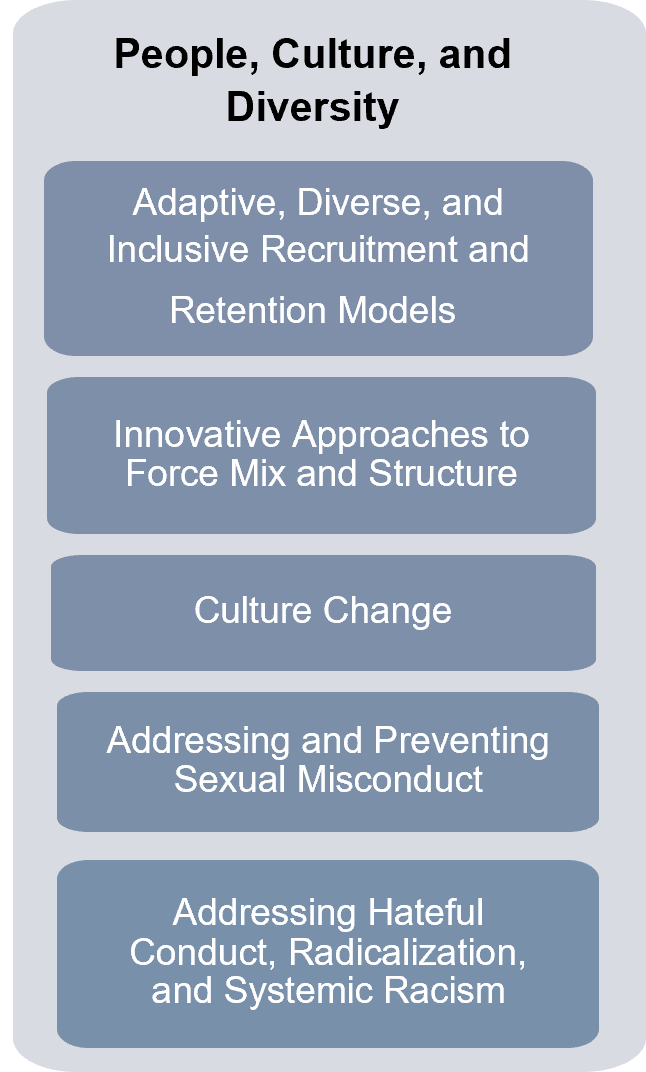
Caption
Five boxes listing the Policy Challenges under People, Culture, and Diversity:
- Adaptive, Diverse, and Inclusive Recruitment and Retention Models
- Innovative Approaches to Force Mix and Structure
- Culture Change
- Addressing and Preventing Sexual Misconduct
- Addressing Hateful Conduct, Radicalization, and Systemic Racism
People, Culture, and Diversity
The operational success of the CAF begins with a robust recruiting system that engages and attracts the best and brightest, communicates the unique opportunities and benefits of military service, efficiently and effectively selects and enrolls new recruits, and incentivizes recent recruits to remain.
New this year was the inclusion of Culture Change as a stand-alone theme as recent experiences have highlighted the need to identify and critically examine the many factors that influence cultural practices and outcomes in Canadian defence.
Also new this year were the added emphasis on the Reserve Force to the 'Force Mix and Structure' Challenge, and the addition of sexual trauma and response mechanisms in the 'Addressing and Preventing Sexual Misconduct' Challenge.
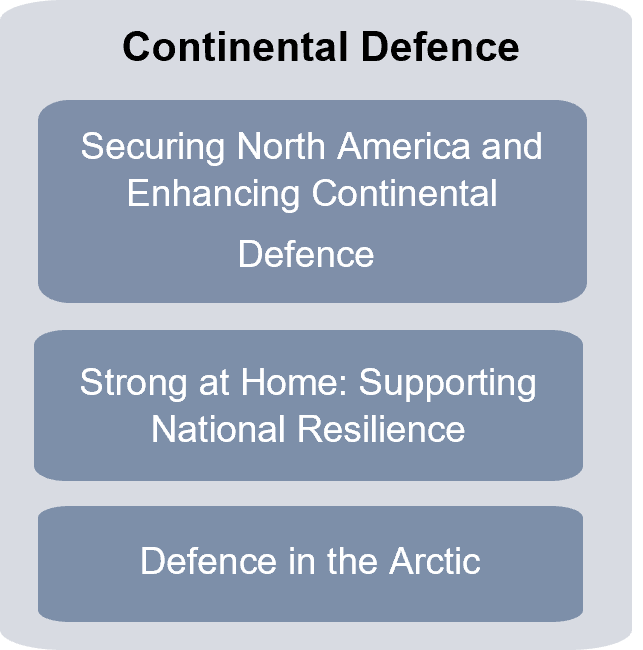
Caption
Three boxes listing the Policy Challenges under Continental Defence:
- Securing North America and Enhancing Continental Defence
- Strong at Home: Supporting National Resilience
- Defence in the Arctic
Continental Defence
DND/CAF play an important role in ensuring Canada's national defence and supporting its security, stability and prosperity. This year, greater attention to the intersections of national resilience and continental defence, including the technology, supply chain, and COVID-driven aspects were included in the Continental Defence Policy Challenge. The MINDS team also included procurement and the role of Defence in pandemic response into the 'National Resilience' Challenge.
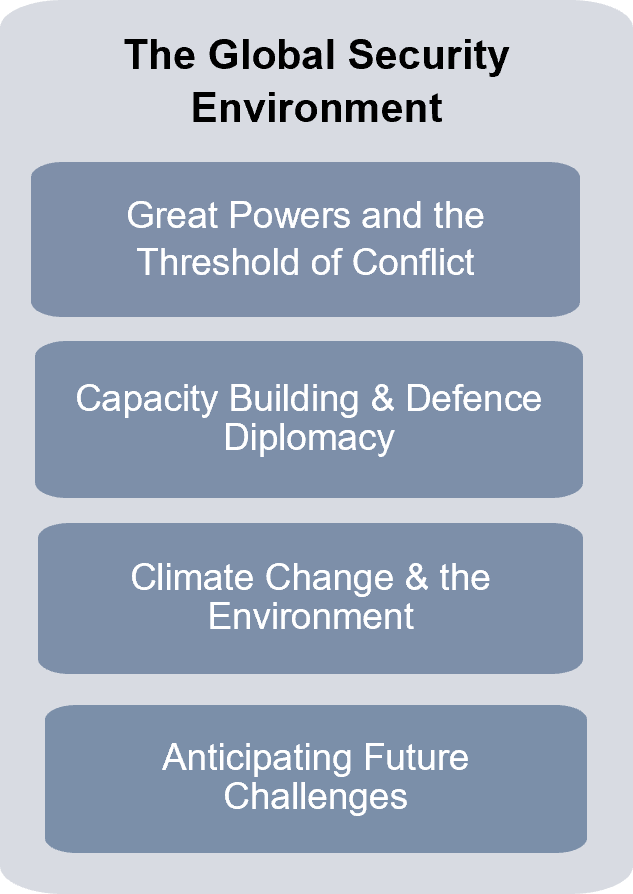
Caption
Four boxes listing the Policy Challenges under The Global Security Environment:
- Great Powers and the Threshold of Conflict
- Capacity Building & Defence Diplomacy
- Climate Change & the Environment
- Anticipating Future Challenges
The Global Security Environment
To reduce overlap, the 'Grey Zone/Hybrid Warfare' and the 'Evolving Role of Major Powers' Challenges were combined to become the 'Great Powers and Threshold of Conflict' Policy Challenge. Similarly, the 'Capacity Building' and 'Defence Diplomacy' challenges were combined, and both were revised to include greater focus on maximizing, measuring, and strategically communicating effects. The MINDS team also incorporated a greater focus on climate change's strategic and geopolitical impacts in this challenge. Lastly, the 'Anticipating Future Challenges' Challenge was altered to better reflect long-term and emerging challenges, such as procurement, technology and social factors like gender and demographics.
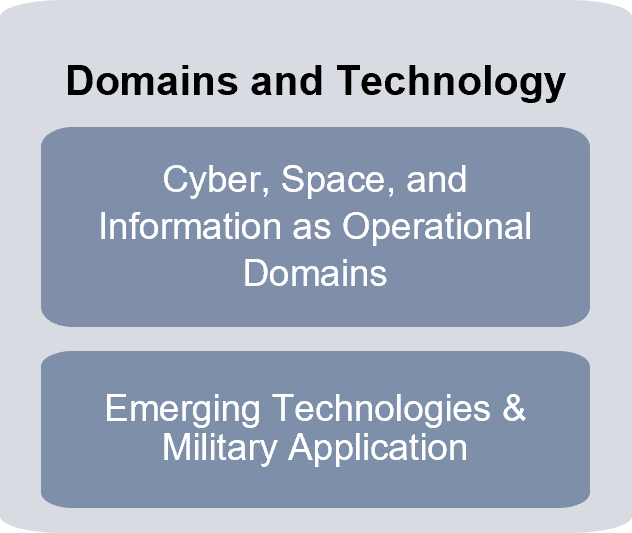
Caption
Two boxes listing the Policy Challenges under Domains and Technology:
- Cyber, Space, and Information as Operational Domains
- Emerging Technologies & Military Application
Domains and Technology
In an increasingly complex, opaque, and volatile security environment, adversaries are competing across multiple domains concurrently; cyber, space. This Policy Challenge was updated to highlight the need for DND/CAF to rapidly anticipate, adapt and act against pan-domain challenges, and to translate technological advancements into military capabilities to retain a necessary technological edge alongside key allies.

Caption
One box listing the Policy Challenge under the Rapid Response Policy Challenge:
- Impacts of the Russia-Ukraine War
Rapid Response Policy Challenge
The Rapid Response Mechanism provides financial support to quickly respond to the evolving security environment and fast-moving requirements for expert advice. In 2022, MINDS launched a Rapid Response competition to generate advice and insights on the implications of the War in Ukraine.
B – Expert Briefing Series
Through the Expert Briefing Series (EBS), top Canadian and international defence and security experts are invited to brief the Defence Team and Government of Canada officials on priority issues. Through virtual webinars and roundtable discussions, defence and security practitioners engage in rich conversations with leading experts and diverse thinkers.
Highlights
In 2022-23, MINDS hosted 22 expert briefings and roundtable engagements on a range of complex challenges. A list of all engagement titles is included in Annex A. The most frequent Policy Challenge addressed in the Expert Briefing events in 2022-23 was the 'Global Security Environment' Challenge. Through the Expert Briefing Series mechanism, MINDS helped inform the Defence Team's understanding of shifts in the global security environment by facilitating relevant and timely briefings to address key issues.

Caption
A map of the world with three regions circled to show the themes of MINDS briefings.
- Canada highlighted in red, and the United States highlighted in blue. The two countries are circled with a text bubble pointing to them stating, "3 Briefings on Continental Defence".
- Russia and Ukraine highlighted in blue and circled with a text bubble pointing to them stating, “2 Briefings on Russia War in Ukraine".
- The Indo-Pacific region highlighted in yellow and circled with a text bubble pointing to it stating, "3 Briefings on the Indo-Pacific Region".
C - Targeted Engagement Grants
The projects that MINDS funds help to drive innovation, amplify expert and diverse voices, spark wider discussions, and inform policy discussions on important and timely defence and security issues. Targeted Engagement Grants provide up to $50,000 in non-recurring financial support for projects such as conferences, roundtables, workshops, research, and publications. To continue to foster the next generation of experts, grants valued at $10,000 are also available under the Young MINDS Initiative for undergraduate and Master's students at an accredited university.
2022-23 Funding Results
The full overview of all funded projects can be found at Funding Results - Canada.ca.
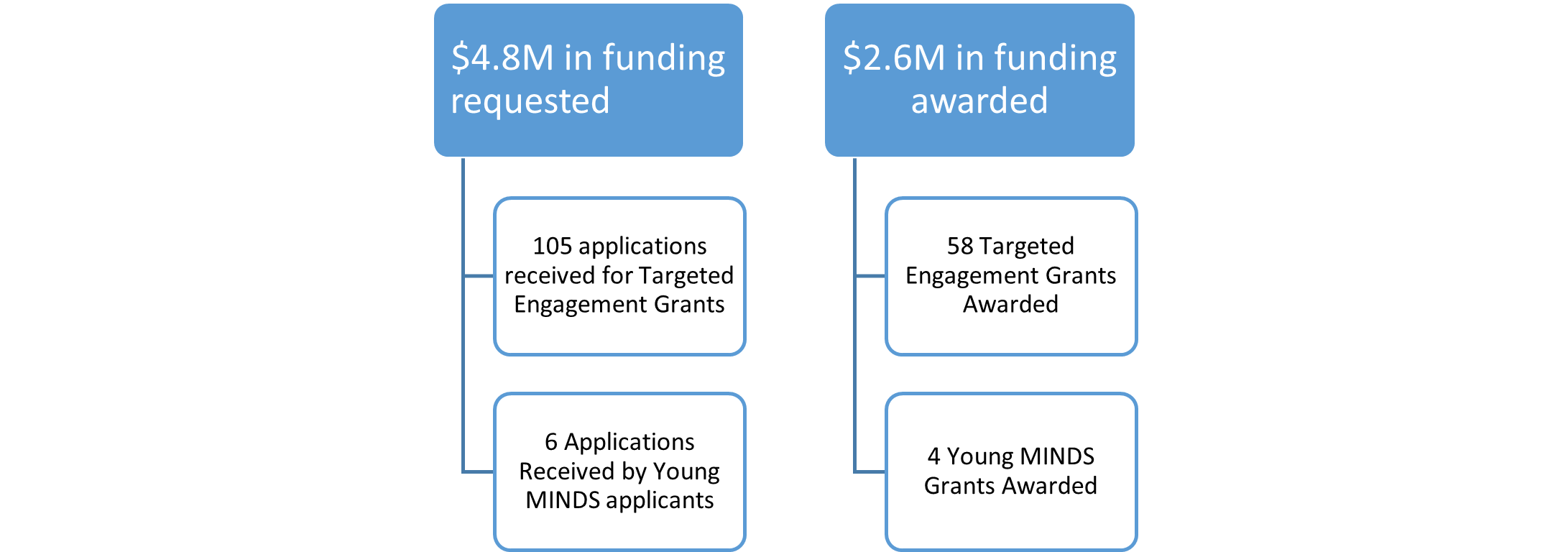
Caption
Two sets of boxes. The set on the left starts with a blue box at the top stating “$4.8M in funding requested”. A white box underneath states “105 applications received for Targeted Engagement Grants”. Another white box underneath states “6 applications received by Young MINDS applicants”
The set of boxes on the right starts with a blue box at the top stating “$2.6M in funding awarded”. A white box underneath states “58 Targeted Engagement Grants Awarded”. Another white box underneath states “4 Young MIDNS Grants Awarded”.
Highlights
In 2022-23, MINDS received Targeted Engagement Grant applications from around the world, with 18% of all submissions coming from international applicants. All international applications came from countries that are trusted partners, such as NATO countries and Australia.
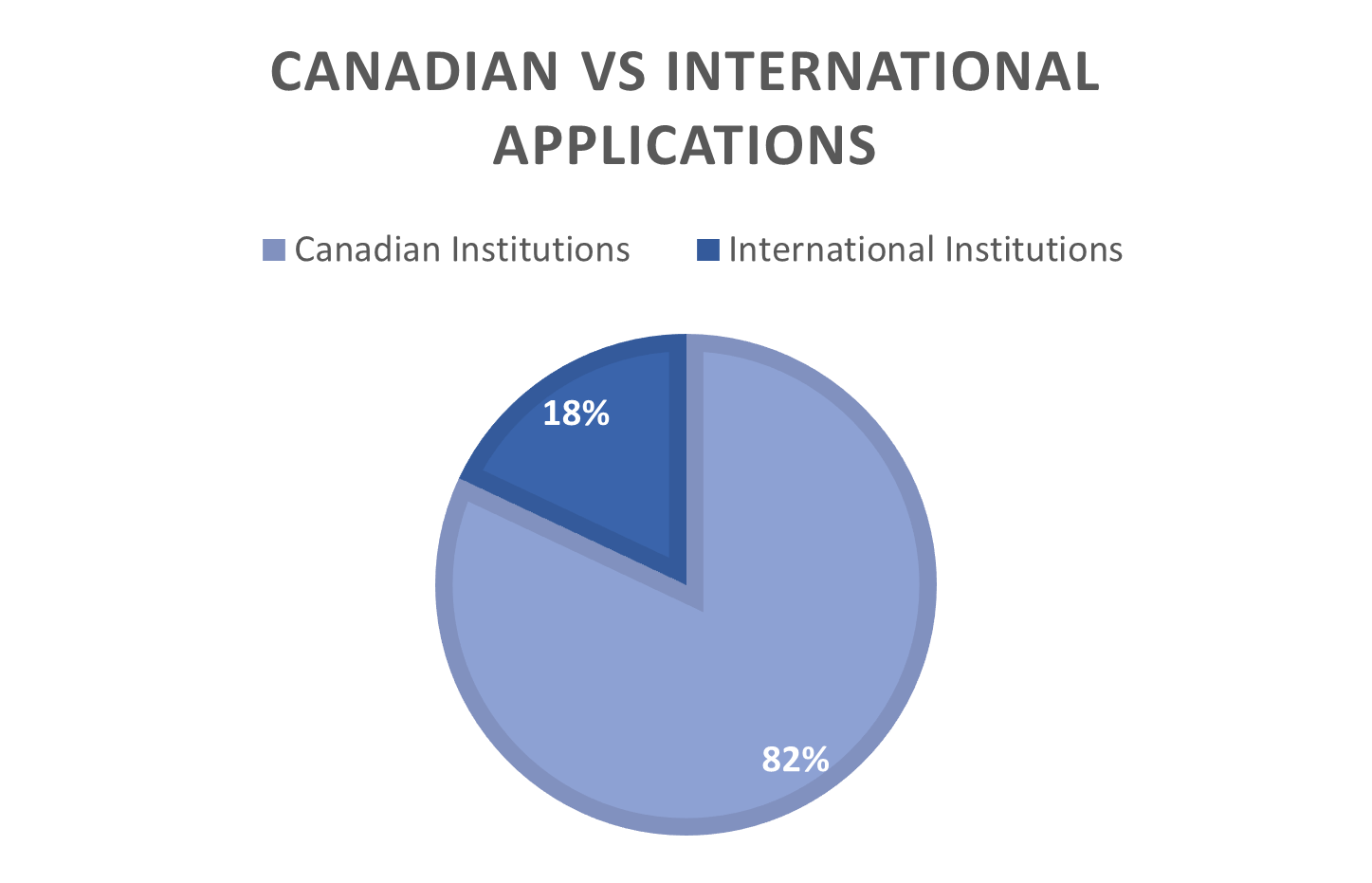
Caption
A pie chart showing applications received from Canadian institutions (82%) vs international institutions (18%).
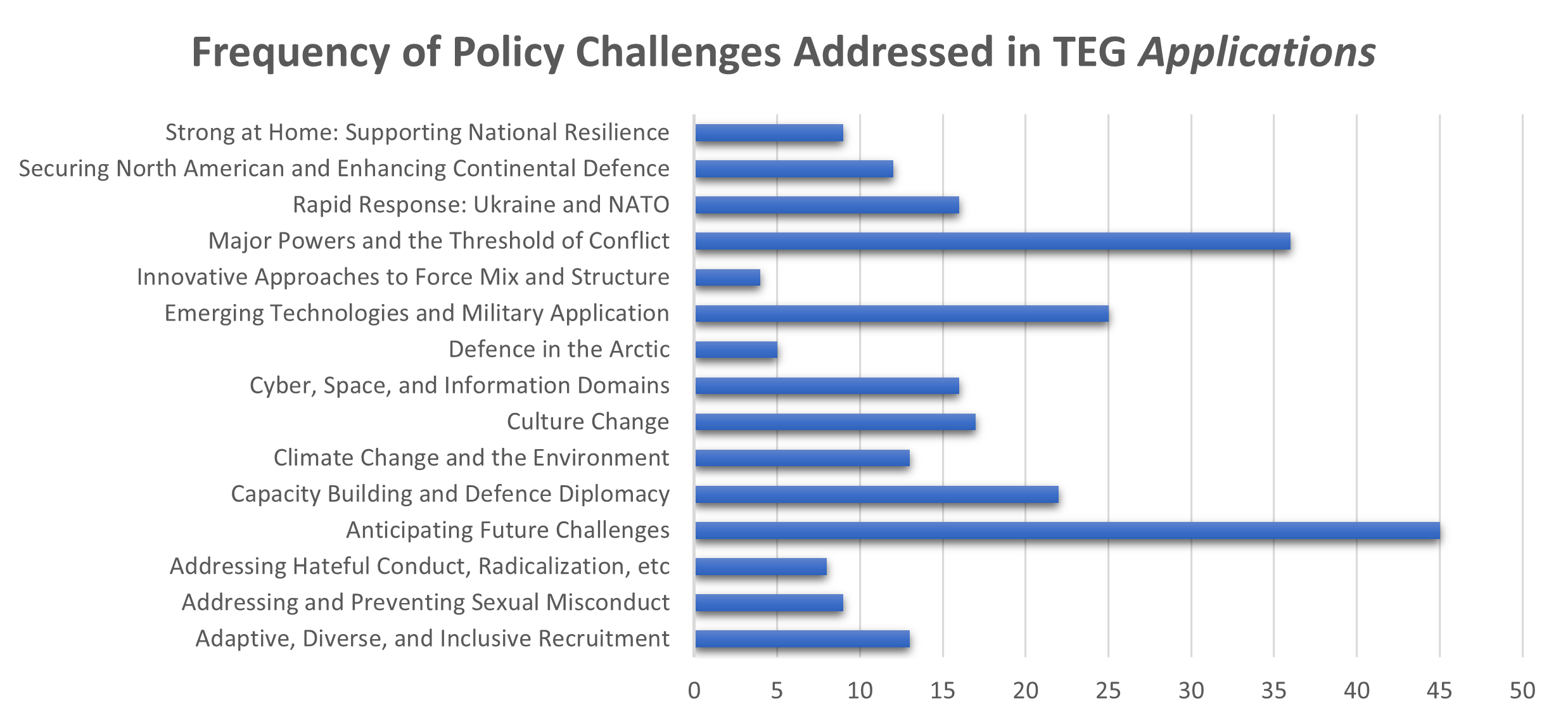
Caption
Two bar charts indicating the number of policy challenges addressed in TEG applications and successful TEGs respectively.
The first bar chart indicates the frequency of policy challenges addressed in TEG applications:
- Strong at Home: Supporting National Resilience: 9
- Securing North American and Enhancing Continental Defence: 12
- Rapid Response: Ukraine and NATO: 16
- Major Powers and the Threshold of Conflict: 36
- Innovative Approaches to Force Mix and Structure: 4
- Emerging Technologies and Military Application: 25
- Defence in the Arctic: 5
- Cyber, Space, and Information Domains: 16
- Culture Change: 17
- Climate Change and the Environment: 13
- Capacity Building and Defence Diplomacy: 22
- Anticipating Future Challenges: 45
- Addressing Hateful Conduct, Radicalization, etc.: 8
- Addressing and Preventing Sexual Misconduct: 9
- Adaptive, Diverse, and Inclusive Recruitment: 13
Note: Each Targeted Engagement Grant application can list up to 3 Policy Challenges
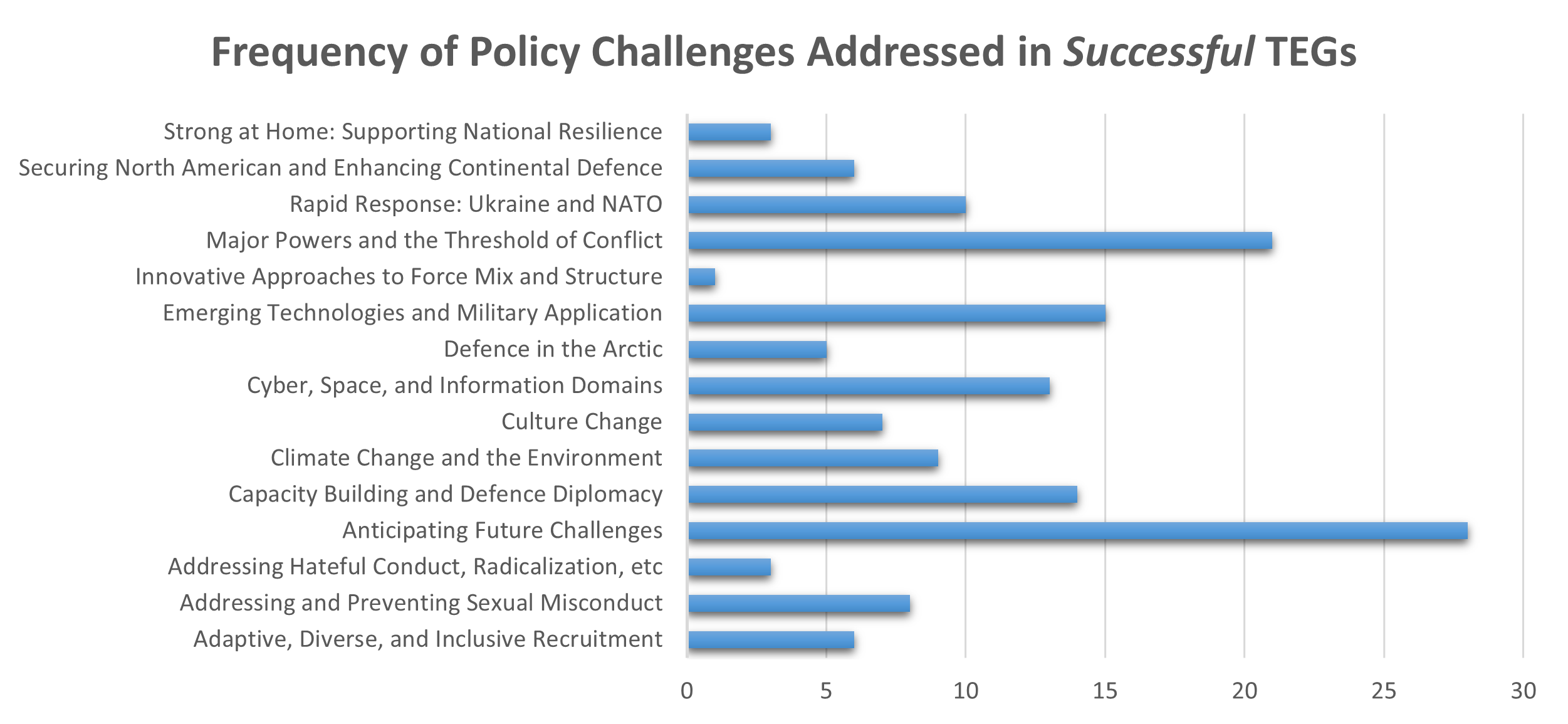
Caption
The second bar chart indicates the frequency of policy challenges addressed in successful TEGs:
- Strong at Home: Supporting National Resilience: 3
- Securing North American and Enhancing Continental Defence: 6
- Rapid Response: Ukraine and NATO: 10
- Major Powers and the Threshold of Conflict: 21
- Innovative Approaches to Force Mix and Structure: 1
- Emerging Technologies and Military Application: 15
- Defence in the Arctic: 5
- Cyber, Space, and Information Domains: 13
- Culture Change: 7
- Climate Change and the Environment: 9
- Capacity Building and Defence Diplomacy: 14
- Anticipating Future Challenges: 28
- Addressing Hateful Conduct, Radicalization, etc.: 3
- Addressing and Preventing Sexual Misconduct: 8
- Adaptive, Diverse, and Inclusive Recruitment: 6
D - Collaborative Networks
MINDS Collaborative Networks bring together multi-disciplinary teams of distinguished experts, from across Canada and abroad. Each Network receives up to $750,000 over three years to enable more sustained collaboration and supports DND/CAF through advanced research and activities.
A call for Network applications was launched in November 2021, resulting in 16 applications. Applicants were primarily from academia (11), but also not-for-profit organizations (4), and private entities (1).
After a rigorous evaluation process, the three Collaborative Networks selected for 2022-23 were:

Canadian Defence and Security Network (CDSN)
Carleton University
The Canadian Defence and Security Network is a comprehensive partnership of academic, military, public, and private organizations aimed at connecting and amplifying the policy-relevant research of its members.
Director: Dr. Stephen Saideman
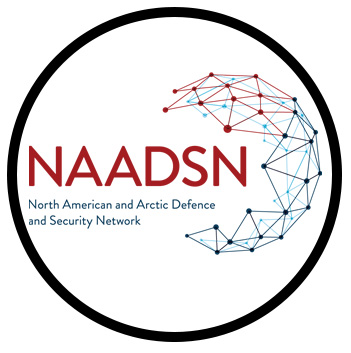
North American and Arctic Defence and Security Network (NAADSN)
Trent University
NAADSN is a series of relationships – of nodes and ties extending from coast to coast to coast within Canada, while also reaching outside to security partners in the United States and Europe. The network addresses three core policy challenges: Defence in the Arctic; Securing North America and Enhancing Continental Defence; and Climate Change and the Environment
Director: Dr. Whitney Lackenbauer
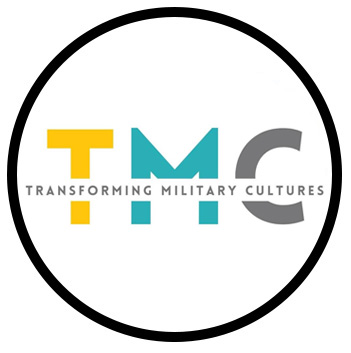
Transforming Military Cultures Network (TMC-Net)
Mount Saint Vincent University
The Network’s research aims to bring new ways of understanding the problem of DND/CAF culture change by drawing on critical perspectives, input from people with lived experience, and international lessons learned. The Network uses critical intersectional feminist frameworks to understand current CAF culture and develop strategies to transform this culture.
Co-Directors: Dr. Maya Eichler, Dr. Tammy George, & Dr. Nancy Taber
Highlights
More information on all our Networks can be found at: Collaborative Networks - Canada.ca
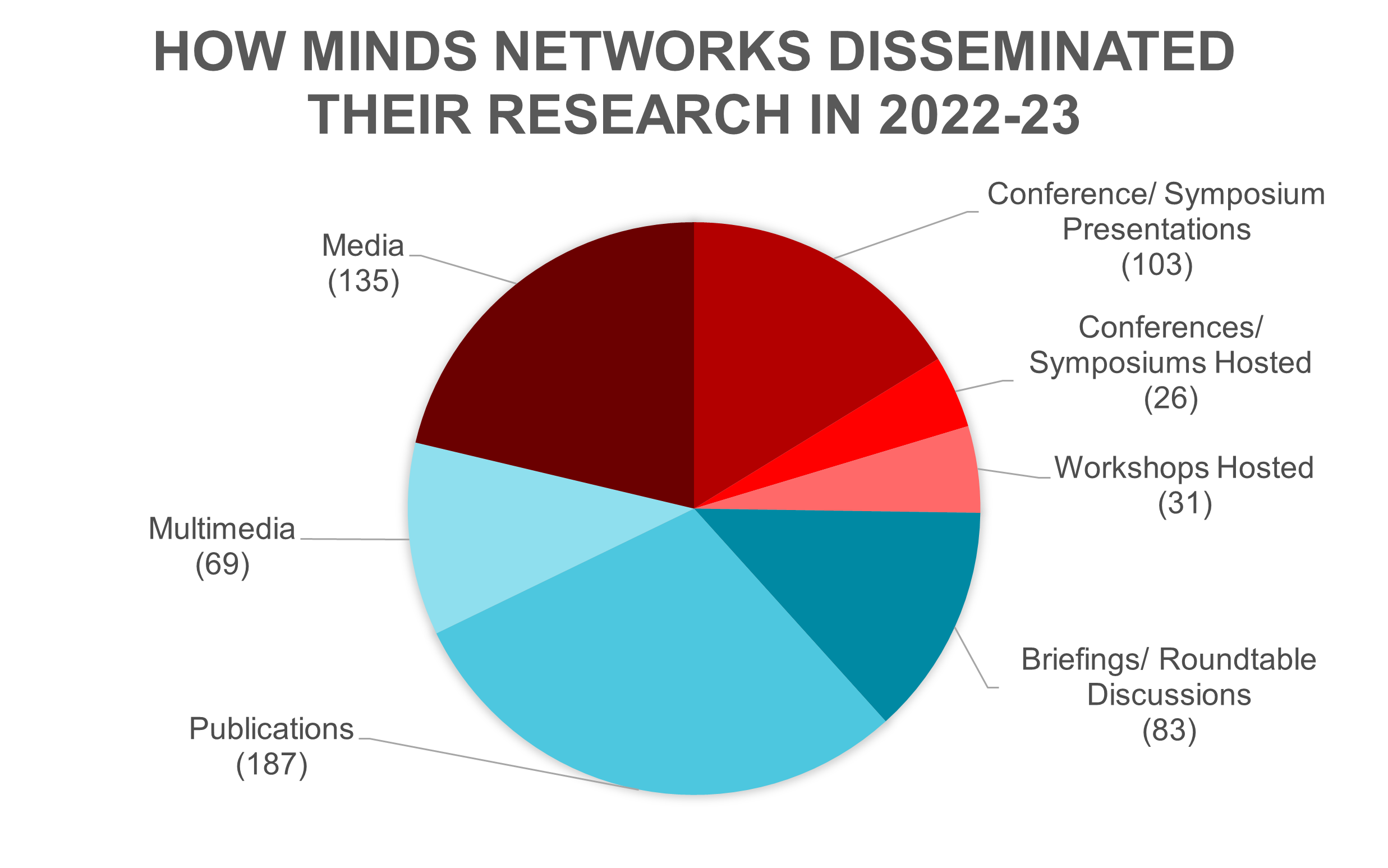
Caption
A pie chart showing how MINDS Collaborative Networks disseminated their research in 2022-23:
- Conference/symposium presentations: 103
- Conferences/symposiums hosted: 26
- Workshops hosted: 31
- Briefings/roundtable discussions: 83
- Publications: 187
- Multimedia: 69
- Media: 135
Highlights From Existing Collaborative Networks
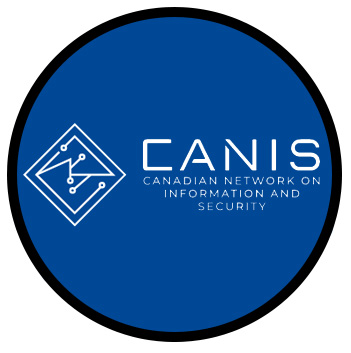
Canadian Network on Information and Security (CANIS)
University of Calgary
- Hosted the CANIS international conference on the impact and challenges of misinformation in a diverse society.
- Held the first CANIS Summer School course through the School of Public Policy at the University of Calgary.

Research Network on Women, Peace and Security (RN-WPS)
McGill University
- Hosted three speaker series events organized by the Network’s Youth Advisory Board.
- Hosted two roundtables on best practices for youth-driven peacebuilding and the prospects and challenges of The Triple Nexus.
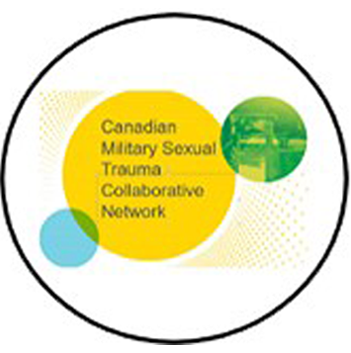
Canadian Military Sexual Trauma Collaborative Network
McMaster University
- Delivered four presentations on military and veteran health at the 12th annual Canadian Institute for Military and Veteran Health Research conference.
- Presented at the Understanding Military Culture to Support Organizational Change workshop hosted by NATO and the Swedish Defence University.

Network for Strategic Analysis (RAS/NSA)
Queen’s University
- Launched the Military Deployment Index, a new measure of global military deployments for use by defence security researchers.
- Hosted webinars and produced a number of publications centred on the war in Ukraine and Russia’s global ambitions.
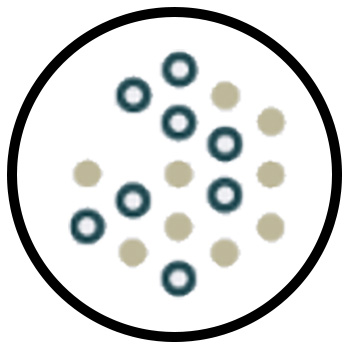
Innovative Methodologies for Defence Challenges Network
Archipelago of Design
- Designed two workshops with CAF personnel for Military Personnel Command to address recruitment and retention challenges.
- Ran successful playthroughs of the ‘serious game’ Breakthrough project with 7th Intelligence Company, 4th Division and the Canadian School of Public Service.

Network for Research on Right-Wing Extremism in the CAF
Ontario Tech University
- Briefing to the Dutch Ambassador on the contours of the RWE movement in Canada, including engagement by military and law enforcement personnel.
- Participated on a panel about the intersections between Cybersecurity, Climate Change, Extremism, and Health.
E - Scholarships
MINDS is committed to fostering the next generation of defence and security experts. In 2022-23, the MINDS Scholarship initiative and the NATO Defense College (NDC) Fellowship continued to thrive.
MINDS-SSHRC Joint Scholarships Initiative
MINDS scholarships offer research awards and supplements at the master's, doctoral and postdoctoral levels to students and researchers whose work relates to the MINDS Policy Challenges. The program contributes to the development of a growing, inclusive and diverse expert community, notably through one-year awards for Indigenous master's students studying defence and security issues.
| Type of Research Training Award | Awards Distributed (#) | Value ($) |
|---|---|---|
| MINDS Initiative Doctoral Awards (up to 3 years) | 1 | 35,000 |
| MINDS Initiative Doctoral Awards (1 year) | 4 | 140,000 |
| MINDS Scholarship Initiative Supplements | 20 | 200,000 |
| MINDS Master's Scholarships Indigenous Students | 1 | 17,500 |
| Total | 26 | 392,500 |

Caption
A box highlighting the 2023 NATO Defense College Fellow – Dr. Daniel Shultz. Dr. Shultz, an archaeologist and historian, researches the exploitation of cultural heritage in information warfare by state and non state actors. He will apply his NATO expertise to pioneer research on opportunities and challenges for Canada and NATO in a complex security landscape.
NATO Defence College Fellowship
The NATO Defense College (NDC) Fellowship provides a unique opportunity for a Canadian researcher to work alongside experts from across allied countries at the NATO Defence College in Rome, Italy. The Fellowship contributes to Canada's commitment to NATO and helps advance both Canada and the Alliance's strategic objectives through forward-looking research and collaboration.
The Year Ahead…
Broadening the Diversity of Perspectives
MINDS is founded on the idea that policy- and decision-making are strengthened when assumptions are challenged, and diverse viewpoints are considered. With this in mind, the MINDS program remains committed to diversifying and expanding its pool of applicants for all of its funding mechanisms. To maintain diverse representation, MINDS will continue to work towards expanding the range of voices that are supported.
Sustaining Engagement on Defence Priorities
In 2022-2023, the Defence Team continued to leverage MINDS' network of experts and academics and advanced discussions on defence policy that began with the program's inception in 2019. MINDS-funded experts participated in targeted engagement sessions to inform the Defence Policy Update and helped inform policy thinking about evolving defence and security challenges. The MINDS program will continue to identify similar engagement opportunities for academic and expert communities, and as the review of Canada's Defence Policy progresses, will ensure the program remains aligned with policy objectives and priorities.
Providing Relevant and Timely Advice
MINDS will continue to support the Defence Team's access to timely, relevant, and high-quality expertise. The program will continue to engage experts on critical defence issues such as procurement, recruitment, and modernization, amongst others, and key security topics such as Russia's ongoing invasion of Ukraine, the evolving importance of the Arctic, and Canada's increasing focus on the Indo-Pacific region. The MINDS Policy Challenges will be updated to respond to the changing nature of the global defence landscape and to address topics that reflect the diverse and complex challenges faced by DND/CAF.
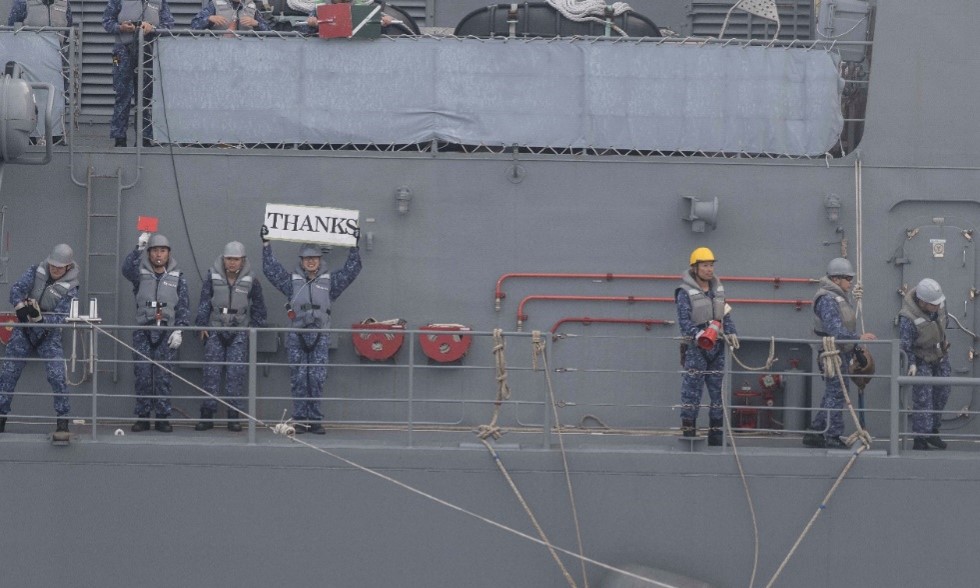
Caption
Japanese Ship (JS) Yudachi Murasame's crew thanks Motor Vessel (MV) Asterix's crew for their support in the East China Sea on 9 November 2023. Please credit: Master Sailor (MS) Marilou Villeneuve-Last, Canadian Armed Forces Photo
Stay In Touch!
Annex A: List Of Expert Briefing Series
People, Culture, & Diversity
- Military Culture: Masculinities and the Warrior Identity
- Taking a New Direction: CAF Reconstitution Efforts
Continental Defence
- Defence Cooperation in a Changing Arctic
- Voice from the North: Indigenous Perspectives and Contributions in the Context of Continental Defence
- NORAD Modernization
The Global Security Environment
- A Damaged Planet: Climate Security in Canadian Policy
- Applied History: Insights from the UK's Integrated Defence Review and Beyond
- Climate Change and the Policy Landscape
- Strategic Competition: Implications for the Global Security Environment
- Russia's Presence in Africa and the Middle East
- North Korean Foreign and Domestic Policy
- Indian Foreign and Defence Policy in the Context of Canada's New Indo-Pacific Strategy
- Why We Fight: The Roots of War and the Paths to Peace
- Canada's Role in Peace Operations: Charting a Path Forward
- Rethinking Risk Management
- Canada in the Indo-Pacific: Strategic Objectives and Initiatives
- The Elsie Initiative: Reflections and Next Steps
Domains and Technology
- Quantum Leaps: The Impacts of Quantum Technology on Intelligence
- Confronting Rapid Change Through Military Innovation & Procurement
- Threats and Opportunities for the Future of Canadian Airpower
Rapid Response: Impacts of the Russia-Ukraine War
- The War in Ukraine's Donbas: Origins, Context, and the Future
- Strategic Implications of the War in Ukraine


